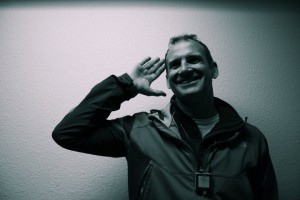
Bill Barkeley, , executive committee of the Hearing Loss Association of America
I have not managed to meet him personally, but have followed his adventures, read his stories, I looked at his photos and clips. Sometimes when you have several news of a persona and you can follow a few steps, you have the feeling to know him/her a little’. Not that the stories of actors and football players that appear in newspapers allow me to say that I know Brad Pitt or Ronaldinho, but there are people who allow themselves to discover through their image or pieces of stories they tell. It is Bill Berkeley, who also suffers from Usher Syndrome Type 2, like me.
Challenge your limits, go beyond normal human capabilities has always been one of the characteristics of the man who loves to deal with the huge, empty, speed, depth, anyhow with the extreme and with the unknown, of nature as a real mirror of the unknowable vastness within.
Bill Berkeley chose to transform the narrow vision, night blindness and hearing loss, (he is legally blind and his hearing loss is 85 percent bilateral, progressive, severe sensorineural hearing loss), in vertical walls, rocky slopes and peaks to climb.
In 2007, Bill, 45, has climbed Mount Kilimanjaro, an inactive volcano in northeast Tanzania, and with 5891 meters the highest peak in Africa.
In July 2010, Bill led a group of boys (with and without hearing loss) in the Peruvian Amazon for the first Hear the World expedition Hear the World is a global initiative of hearing systems manufacturer Phonak to raise awareness about the importance to hear and the consequences of hearing loss.
Currently (May 2011) is located at the foot of the highest peak in Colorado that will climb to celebrate the anniversary of the first ascent of Everest by a blind man, Erik Weihenmayer.
There are many other cases of disabled (read our article on Kevin Frost) who perform incredible feats, also told in some movies, the last Soldiers to the Summit and Blindsight, No Barriers USA tells stories and supports athletes who do not know barriers, but I wonder
How can these stories, these examples become truly an incentive, a motivation? The incredible stories are great to tell, to listen to, are fascinating, but they are stories of others. As I finish reading the article, watched the video, if I still have eyes for it, what I have left? Should I start training? Begin to climb mountains? Emulate?
I do not think this is the way, it should only be an answer to the question CAN IT BE DONE?
It takes motivation, determination, courage and perseverance. These are qualities that serve everyone, disabled or not, to get results, but people with disability use a lot of energyto focus on the small difficulties of everyday life, like crossing the street, moving from city to city, finding a job .
You, for example, what benefits do you get from the story of Bill?
Which one are your mountains?
He has reached the highest point on Mount Kilimanjaro, reached a peak, a goal. And you? What are your achievements?
Before you climb a mountain you have to understand where it is and how it’s shaped. If to have Usher’s Syndrome means to climb cliffs of darkness and silence, how do you reach the top?
WATCH THE VIDEO
OTHER ARTICLES ABOUT BILL BARKELEY
• Bill Barkeley Grand Rapids, USA – Hear the World
• Bill Barkeley – TMG Catholic Speakers Services
• No Barriers: Bill Barkeley
• No Barriers USA Success Stories
AUDIO INTERVIEW: Bill explains his condition, tells his story to the microphone of Grand Rapids Lions Club

